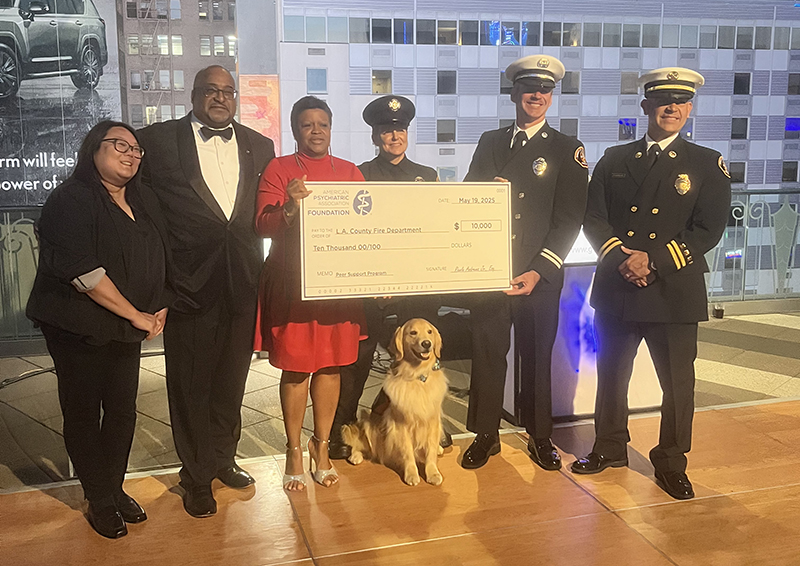Most people are exposed to five or six traumatic events in their entire lives, but firefighters may experience that much trauma in a single shift. The County of Los Angeles Fire Department’s (LACoFD) long-standing Peer Support Program connects firefighters to trusted teammates and mental health professionals for assistance. The APA Foundation was proud to recognize the LACoFD and the life-saving work of their Peer Support Program with a gift of $10,000 at the 2025 APA Foundation Benefit. We later sat down with Peer Support Captain Vince Roldan, Peer Support Captain Brian Underwood, and Battalion Chief Andrew Ronnow to learn more about sustaining mental health as a first responder.

In 1986, an airliner crash took place in the city of Cerritos within Los Angeles County. All passengers in the air, as well as 15 people on the ground, perished. The incident devastated the region. Fire department personnel recognized that team members were struggling to cope with what they saw during and after the crash, leading to the formation of a Critical Incident Stress Management Team (CISM) that allowed members to talk to peers about what they had experienced and the mental burden that they carried. A chaplain had been supporting families in the aftermath of line-of-duty deaths since the late 1940s, but the scope of the Cerritos incident was a wake-up call, proving to leaders that mental health care resources needed to be integrated into firefighters’ routines.
The foundation of the Los Angeles County Fire Department’s Peer Support Program was born, but mental health stigma kept the program from fully flourishing until about fifteen years ago, when the tides started to turn. Today, peers in every rank of the fire department – from firefighter to engineer, captain, professional staff, and more – have a dedicated group where they can turn to discuss critical incidents and tougher calls as they go through their career.
Peer support has bridged the gap between behavioral health providers and peers who understand the unique lifestyle of a firefighter. As the years went on, the LACoFD increased their understanding of how to care for their teammates and brought in clinicians that understand the fire service lifestyle. “As a firefighter, you can be at work for two to five days, or even weeks at a time. We commonly miss out on birthdays and holidays, and our spouses may sometimes feel like single spouses. Clinicians who understand that culture can help us get to the root of our issues better,” said Captain Roldan.
How it works: Multiple coordinators, peer leads, and dispatchers work together on each shift. Under that, over 200 peers are ready for activation (many of them current and former firefighters). All peers receive a two-day training course on how to help other members in the department. When there is a need, the dispatch team is notified and connects a peer with the member who needs support for either one-on-one or group conversations. Then, on a case-by-case basis, the individual may progress to a mental health professional, or the situation may be resolved.
“We get notifications when there is the death of a child or of a department member, and we reach out to the units who were on scene. We’re always going to be part of the response to those incidents, and that’s where we acknowledge to them that something significant happened. That acknowledgement is so important. And sometimes we just show up and listen,” said Captain Roldan. “Sometimes we’ll have one-on-one conversations over the weekend or in the middle of the night, and those people are just looking for someone to listen to them. Sometimes there are mental health referrals, but sometimes people just need a bit of perspective and encouragement, and to know that someone will check up on them.”
The Peer Support Program has been successful as more and more firefighters start to understand that it’s okay to open up and use the services offered, whether that means traditional talk therapy with a psychiatrist or simply connecting with a trusted friend. “We are starting to have programs now that are proactive instead of reactive, but it’s been a long, slow build. As the years go on, you see how it’s being embraced more and how the value in it is seen,” said Chief Ronnow. “We can count how many members we’ve lost to mental health misfortunes, but we’ll never be able to quantify all the members we’ve saved. I firmly believe in my heart that that number is far larger than the number of those we’ve lost, just from the feedback we’ve gotten.”
The funding received from the APA Foundation will support expanded mental health care services, including transportation and care in the only hospital in the country that serves exclusively firefighters (the IAFF Center of Excellence in Croom, Maryland). In many cases, individuals seeking treatment are struggling with finances, and receiving fully funded treatment at the Center allows them to experience a fresh start that they badly need.
“In movies we’ve seen, if there was a hero, they’d walk through explosions. They’d get shot in the arm and just brush it off and keep moving,” said Captain Underwood. “It was hard to get rid of that idea, because that’s what all of us were taught that a hero was. You just brush off the emotional side of it and keep moving forward – but slowly, that builds up. The difference now with the Peer Support team is that there’s a big push to let people know that it’s okay not to be okay. That’s where you really open it up so that people can have these discussions and we can start healing.”
You can support the maintenance and expansion of the LACoFD’s Peer Support Program by donating to APA Foundation’s 2025 California Wildfires Recovery Fund. Make a one-time donation or a recurring gift to address the immediate and long-term mental health needs of first responders.
